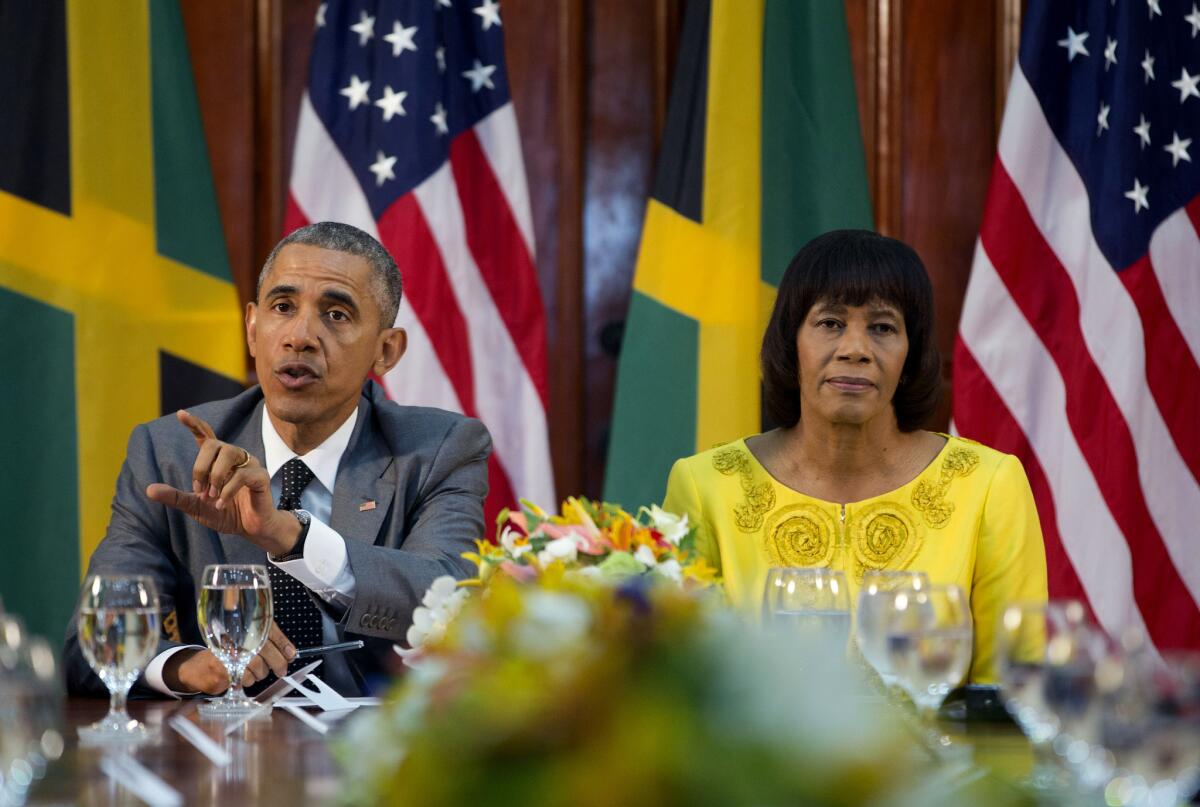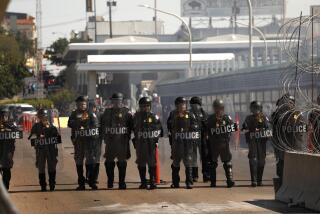Cuba may lose ‘sponsor of terrorism’ designation

President Obama and Jamaican Prime Minister Portia Simpson-Miller meet Thursday in Kingston, Jamaica, where Obama said he soon will decide whether to remove Cuba from the U.S. list of state sponsors of terrorism.
- Share via
Reporting from Panama City — President Obama said Thursday that his State Department had finished a review of whether to remove Cuba from the list of state sponsors of terrorism, potentially the first step in formally changing U.S. policy toward the island nation at a time of warming diplomatic relations.
Speaking to reporters after meeting with Jamaica’s prime minister in Kingston, the Jamaican capital, Obama said several federal agencies will look at the report before it is given to him.
Obama will review the secretary of State’s recommendation and solicit the views of his national security team, then decide whether to lift the designation, an aide said late Thursday. Obama has said he will act quickly. If he decides to take Cuba off the list, the aide said, the president will submit a report to Congress at least 45 days before the proposed change would take effect.
Obama did not say what the recommendation was, though he hinted that the two countries were making progress toward improved relations.
Obama and Cuban President Raul Castro made a historic announcement in December that they would end half a century without diplomatic relations between their countries. The two sides have been working since to reestablish ties, and they are likely to meet informally this week at a summit in Panama.
“We want to make sure that, given that this is a powerful tool to isolate those countries that genuinely do support terrorism, that when we make those designations we’ve got strong evidence that, in fact, that’s the case,” Obama told reporters. “And as circumstances change, then that list will change as well.”
Since 1982, Cuba has been on the list of countries determined by the State Department to have repeatedly provided support for acts of international terrorism. The designation carries sanctions, including bans on U.S. foreign assistance, defense exports and sales, as well as controls on the exports of some goods and financial restrictions. Iran, Sudan and Syria are also on the list.
Cuba has said the terrorism designation is a major obstacle to reaching an agreement, and White House officials have not ruled out the possibility of changing it while the president is in Panama.
Aides to the president did not disclose what the State Department recommended, but one of them pointed out that North Korea, which President George W. Bush removed from the list in 2008, defies international attempts to contain its rogue nuclear program. By contrast, the aide noted, Cuba is talking with the U.S. about adopting reforms. The aides requested anonymity to discuss the issue before Obama announces his decision.
A decision to end the “sponsor of terrorism” designation would face bipartisan opposition in Congress. However, lawmakers would have few effective tools to counter it, and Democratic congressional staffers question whether Republicans could come up with enough votes to reject the initiative.
In a statement Wednesday, Sen. Robert Menendez (D-N.J.), until recently the top Democrat on the Senate Foreign Relations Committee, warned it would be “another significant misstep in a misguided policy.”
But Rep. Jim McGovern (D-Mass.), a leading critic of the previous U.S. policy of isolating Cuba, said it would add momentum to the process of normalizing relations.
“They don’t belong on the terrorist list; they never did. But nonetheless, we politicize the terror list and put them on,” he said in an interview.
McGovern said he thought it was unlikely that Obama would finalize the decision while attending the Summit of the Americas here Friday after a potential informal meeting with Castro.
“But it would be nice if this occasion could be a time to announce something concrete,” he said.
Obama said the process of establishing diplomatic relations with Cuba “are proceeding as I expected.”
Analysts say the change in designation would broadcast a loud message as Obama arrives for the summit of Latin American states, announcing to leaders that he is intent on turning the page on Cold War relations between the U.S. and the region.
Not incidentally, it might also have the effect of drowning out expected criticism, particularly from Venezuela, that U.S. imperialism is still a fearsome force in Latin America.
“The Venezuelans are trying to redirect attention away from a lot of the problems they have with human rights, the failing economy, the toxic political situation,” said Carl Meacham, a former longtime staffer on the Senate Foreign Relations Committee who directs the Americas program at the Center for Strategic and International Studies.
“The only way you can drown out the Venezuelan narrative is to do something big,” Meacham said. “Go big or go home.”
Obama’s suggestion that the U.S. is moving toward a change in terrorism designation for Cuba is big enough to “drown out the noise,” he said.
In a town hall meeting Thursday in Jamaica with young leaders, Obama said he fully expected to continue having differences with the Cuban government, but not in a way that would keep both sides “imprisoned by the past.”
“We are as committed as ever to supporting human rights and political freedom in Cuba and around the world,” he said. “But I believe that engagement is a more powerful force than isolation, and the changes we are making can help improve the lives of the Cuban people.”
It will take time for the U.S. and Cuba to have normal relations, he said.
“It is important for all of us to be able to speak honestly where we see concerns about issues of human rights and political freedom,” Obama said. “There are still constraints on the ability of the Cuban people to express themselves or to organize political parties or to start a business.”
Memoli reported from Panama City and Parsons from Washington.
For more White House coverage, follow @mikememoli
More to Read
Sign up for Essential California
The most important California stories and recommendations in your inbox every morning.
You may occasionally receive promotional content from the Los Angeles Times.















